Current Lab Members
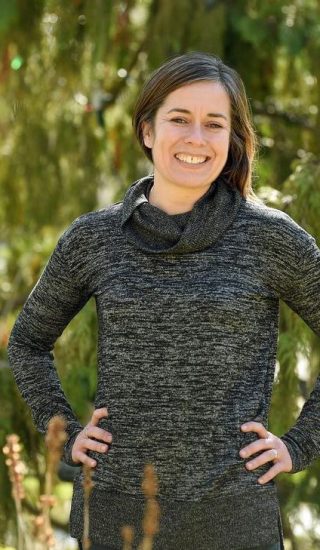
Dr. Jennifer Baltzer
Principal Investigator
Academic Background
PhD (2005) Faculty of Forestry, University of Toronto
BScH (2000) Department of Biology, Acadia University
Biography
2007-11, Assistant Professor, Department of Biology, Mount Allison University
2005-07, Postdoctoral Fellow Center for Tropical Forest Science, Harvard University
Dr. Jennifer Baltzer is a Canada Research Chair in Forests and Global Change at Wilfrid Laurier University, whose work focuses on the drivers of forest composition, structure and function and responses of these systems to global change. She has worked in a range of systems from the tropics to the tundra but currently leads an extensive boreal forest research program throughout the Northwest Territories. Her interdisciplinary research program examines the impacts of climate warming, including permafrost thaw, wildfire regimes, and biome shifts, on the distribution and function of high latitude boreal forests and its implications for northern communities.
Dr. Baltzer works closely with the Government of the Northwest Territories (GNWT) through a 20-year Partnership Agreement between the GNWT and Laurier. Dr. Baltzer plays leadership roles in NASA’s ABoVE campaign, the Smithsonian Institute’s ForestGEO Network, and the CFREF-funded Global Water Futures program. In 2017, Dr. Baltzer was elected to the Royal Society of Canada’s College of New Scholars, Artists and Scientists. Recently, Dr. Baltzer was named Laurier’s 2020 University Research Professor.
Contact Information
Email: jbaltzer@wlu.ca
Phone: 519-884-0710 ext.4188
Twitter: @forestecogrp
Postdocs and visiting researchers
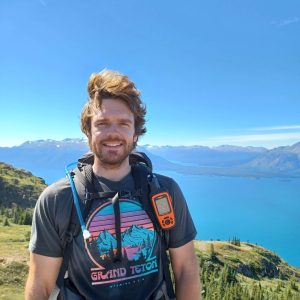
Colin Bonner
Colin’s research is concerned with how climate change affects boreal plant communities, and how resilient they are to disturbances. He is working on how caribou habitat is recovering from wildfires in the Yukon, with a special focus on how pests and pathogens, including the novel aspen-running canker, may affect forest recovery trajectories.
Email: cbonner@wlu.ca
Madeleine Landrum
Ph.D. in Ecology & Environmental Sciences, University of Maine, 2025
B.S. in Environmental Biology, Cazenovia College, 2015
Madi’s research focuses on identifying long-term patterns and drivers of fire regimes in the Northwest Territories. With wildfire becoming more frequent and severe, she is using paleoecological techniques to reconstruct past vegetation and fire severity to see how these spaces have changed at centennial to millennial scales. Madi studies these patterns to better understand the role people and climate play and have played in modern fire regimes, how fire can and has shaped the environment, and ways we can mitigate wildfire risk in northern communities. She is grateful to conduct this research and share this work in the traditional territories of the Salt River First Nation, Fort Smith Metis Council, K’atl’Odeeche First Nation, and Hay River Metis Council
Email: mlandrum@wlu.ca
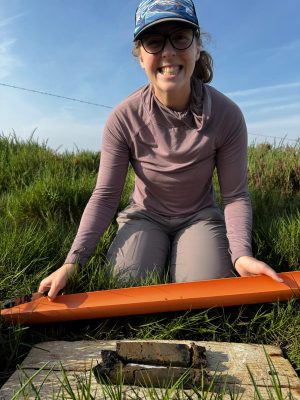

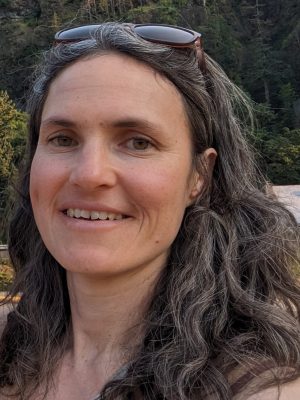
Svetlana Yegorova
B.S. Neuroscience. University of Michigan, 2007.
M.S. Forest Ecology. Oregon State University, 2012.
PhD. Systems Ecology. University of Montana, 2024.
Svetlana studies how climate change and natural resource management influence fire regimes and plant communities. Svetlana is interested in creating research that can directly inform management decisions addressing the linked problems of changing fire regimes and climate change. She is also interested in approaches to make existing science more usable for natural resource management and decision-making. In the Northwest Territories project she investigates whether and how fuels management influences wildfire behavior, and facilitates community engagement to ensure that the science products are useful to natural resource managers. Svetlana has a broad and multifaceted background in ecology: from working as a natural resource manager and addressing the ubiquitous ecological problems on the ground, to modeling anticipated climate impacts to plant communities using a range of empirical approaches. She is excited to develop fire modeling expertise in her current role.
Email: syegorova@wlu.ca
Kayla Wakulich
Kayla’s research focuses on community-specific soil amendment treatment to optimize food production and soil carbon sequestration in the NWT. As a post-doctoral researcher on the Future Harvest Partnership, she will be working hand-in-hand with the project partners to help address questions about enhancing food security in NWT in the face of increasing wildfire, by providing outreach through educational farms.
Email: kwakulich@wlu.ca
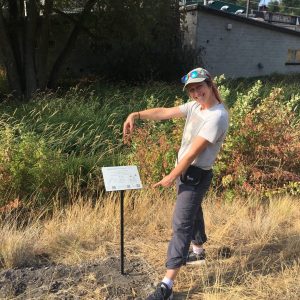

Craig Woodruff
Craig’s research characterizes fuels and vegetation recovery in the boreal forests of the Northwest Territories, where wildfire regimes are changing. He will support multiple remote sensing efforts by analyzing the relationship between burn severity, time, and recovery rate in areas where the time between burns is shortening. Craig uses artificial intelligence and machine learning to develop application focused scientific products from high resolution (detailed) Unmanned Aeriel Vehicle data and coarser satellite data.
Email: cwoodruff@wlu.ca
PhD STUDENTS
Claire Bandet
Claire loves all things arctic and boreal, especially the Rangifer tarandus. After her master’s work researching herbivory in Svalbard, she’s excited to keep working with herbivores (this time: Rangifer tarandus caribou). Now at Laurier, she’s working on modeling how caribou habitat in the Central Yukon recovers after wildfires. Previously, Claire has worked on a range of projects, including tundra carbon flux in Alaska’s North Slope, aquatic invasive species management in New York State, urban bat ecology in Copenhagen, and treeline demography in Adirondack State Park. In addition to her scientific research, Claire has focused on community building and policy work. At her master’s institution, she founded an environmental humanities network and she created a workshop to educate ecologists about ecological grief. In 2024, she was a delegate to COP16 on Biological Diversity in Cali, Colombia, and in 2025, she won the Ecological Society of America’s graduate student policy award. Claire received her B.S. from Syracuse University where she dual-majored in Biology and Environment, Sustainability, & Policy (ESP), and received her master’s from the University of Pennsylvania in Environmental Studies.
Email: band6340@mylaurier.ca

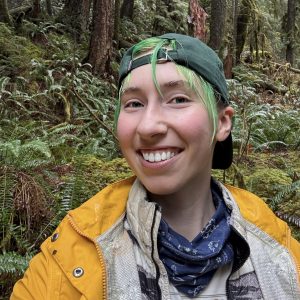
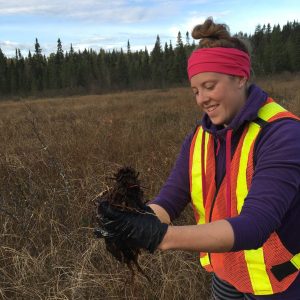
Caitlyn Lyons
Caitlyn is interested in how nutrient release from thawing permafrost is impacting the boreal forest in the Northwest Territories. More specifically, she is focused on the ability of boreal trees to acquire and use these novel nutrients.
Twitter: @Caitlyn24Lyons
Email: lyon8610@mylaurier.ca
Andrea Nichols
Masters of Science, Oklahoma State University, 2019
Bachelors of Science, Oklahoma State University, 2016
Andrea is a PhD student starting with Laurier in Fall 2025. Her research will focus on the impacts of re-burn interval in the Northwest Territories. The research will measure ecological and soil changes that are occurring due to the increasing severity and occurrence of fire in the Northwest Territories boreal forest and plains ecosystems. Andrea has a background in soil science, ecology, post-fire rehabilitation, prescribed and cultural burning, and wildland firefighting in the United States.
Email: nich4670@mylaurier.ca

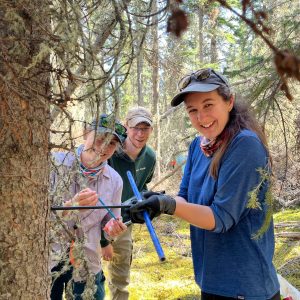
Nicola Rammell
Nicola is studying post-fire forest recovery in Yukon Territory. Using tree ring records, her research investigates how boreal tree species and stands are responding to changing environmental conditions and how resilient they are to disturbance over time.
This work takes place upon the Traditional Territories of the Little Salmon/Carmacks, Selkirk, Na-Cho Nyak Dun, and Tr’ondëk Hwëch’in First Nations.
Email: ramm2270@mylaurier.ca
MSc STUDENTS
Jocelyn Biro
Jocelyn is studying patterns of moose forage recovery following forest harvesting, naturally regenerating wildfires, and wildfires modified by post-fire forest management actions in central British Columbia. Her research tests the common assumption that disturbances benefit moose by increasing early-seral vegetation that is preferred forage. Jocelyn’s research will inform our understanding of the mechanisms contributing to moose population changes. Jocelyn is grateful to live on Wet’suwet’en Nation land and conduct her research on the traditional territory of Witsuwit’en, Nedut’en, Sm’algyax and Dakelh speaking Peoples.
Email: biro6470@mylaurier.ca

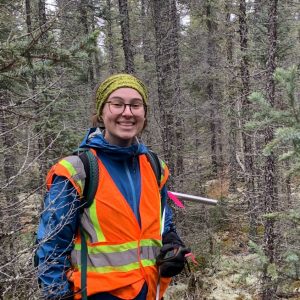
Katerina Coveny
Katerina is interested in understanding how permafrost thaw influences lichen community composition across the Northwest Territories. She will be investigating this across Inuvialuit, Gwich’in, Sahtu and Dehcho lands to contribute to research on Woodland Caribou habitat and winter forage.
Email: cove3330@mylaurier.ca
Twitter: @k_coveny
Keagan Ferguson
Keagan is an MSc student working on understanding the relationship between hydrology and vegetation recovery in areas affected by short interval reburns as a part of the Wildfire Future Resiliency Initiative (WFRI). His research is centred around Wood Buffalo National Park and Fort Smith in the southern NWT where these short interval reburns are a prominent issue for the community. He completed his BSc with a major in biology and a minor in environmental science at Mount Allison University.
Email: ferg7130@mylaurier.ca
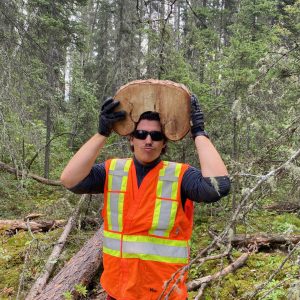

Mackenzie Mihorean
Mackenzie is working on the Fire to Forage: Sustaining Caribou Habitat project specifically looking at aspects of Aspen Running Canker epidemiology and fungal ecology. Mackenzie’s field work takes place in central Yukon collecting samples that are then analyzed in the lab using various molecular techniques.
Email: miho0900@mylaurier.ca
Brian Newton
Brian is a master’s student in the Forest Ecology Research Group. His research focuses on assessing the changing resilience of the boreal forest to wildfire disturbance by measuring the frequency of post-fire forest composition changes.
Email: bnewton@wlu.ca
Twitter: @BrianNewton_

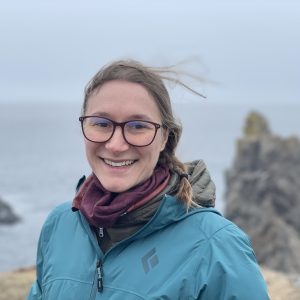
Karelia Del Piero
Karelia is returning to academia to pursue her passion for research and circumpolar ecosystems after six years of working in environmental consulting as a Vegetation Ecologist. She is now studying plant community changes associated with permafrost thaw in the Northwest Territories and will use a combination of field verification and aerial imagery to map and predict landcover across permafrost landscapes. She is particularly interested in identifying drivers and plant indicators of community composition change, and ultimately the broader impacts of landcover change on wildlife species, especially those important to local communities.
Email: delp8640@mylaurier.ca
RESEARCH ASSISTANTS AND UNDERGRADUATE THESIS STUDENTS
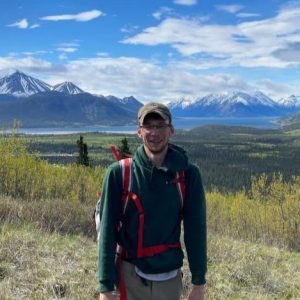
AJ Kellough
AJ is an undergraduate student at the University of Waterloo finishing his degree in Environmental Studies with a minor in Biology. AJ has helped the lab with projects looking at ectomycorrhizal fungi and lichen. He was a Field Research Assistant in Summer 2024. Currently, he is doing an undergraduate thesis with the lab looking at the growth rate and traits of Aspen Running Canker (Neodothiora populina).
Email: akellough@wlu.ca
PROJECT AND LAB COORDINATORS

Emily Bowyer
Emily is a Project Manager with the FERG Lab, assisting with the FIRESCAR and WFRI projects. She has her MSc in Environmental Science and BSc in Biology and Physical Geography.
Email: ebowyer@wlu.ca
Austin McIntosh
Austin is a research technician for the FERG lab and joined in April 2024. He assists students during the summer months in the field with their field work and data collection and the remainder of the year he helps out in the lab/ office.
Email: aumcintosh@wlu.ca

PAST LAB MEMBERS
Dr. Maria Belke-Brea
Dr. Ana Sniderham (PhD)
Dr. Nia Perron (PhD, Laurier, 2024)
Dr. Katherine Standen (PhD, Laurier, 2022) Changes in Plant Community Composition, Structure, and Function in Response to Permafrost Thaw
Dr. Cory Wallace (PhD, Laurier, 2021) Drivers and Consequences of Alnus Alnobetula (Green Alder) Distribution at the Taiga-Tundra Ecotone of the Northwest Territories
Dr. Sabine Dietz (PhD, UNB, 2017) Living at the edge – peripheral plant populations and climate change.
Dr. Anastasia Sniderhan (PhD, Laurier, 2017) Growth dynamics of black spruce (Picea mariana) across northwestern North America.
Elise Brown-Dussault (MSc)
Claire O’Brian (MSc, Laurier 2024)
Emily Ogden (MSc, Laurier, 2022) Impacts of changing permafrost conditions on vegetation productivity in the northern boreal forest
Alexis Jorgensen (MSc, Laurier, 2021) Wildlife Forage Recovery Following Boreal Wildfire
Jason Paul (MSc, Laurier 2019) Near surface permafrost ground ice characteristics and ecological and physical drivers of transient layer ice content in discontinuous permafrost
Alison White (MSc, Laurier, 2018) Drivers of post-fire vascular plant regeneration in the conifer-dominated boreal forest of the southern Northwest Territories.
Katherine Black (MSc, Laurier, 2017) Influence of topography and moisture and nutrient availability on green alder function on the low arctic tundra, NT.
Kirsten Reid (MSc, Laurier, 2017) Effects of wildfires on tree establishment in conifer-dominated boreal forests in southern Northwest Territories.
Allison McManus (MSc, Laurier, 2015) Implications of galling herbivory on ground thaw in Canada’s northern boreal forest.
Melissa Fafard (MSc, Laurier, 2014) The impacts of climate warming-related permafrost thaw and increased hydrological connectivity on wetland plant communities in Scotty Creek, Northwest Territories.
Spenser Morouney (Laurier, 2025)
Keira McManus, (BES Honours, University of Waterloo 2024) Limitations on a frozen feast: Light availability affects boreal plant access to novel nitrogen
Allison Coole (Directed Studies, Laurier 2024)
Madeline Warner (Directed Studies, Laurier 2022)
Jenna Rabley (BSc Honours, Laurier 2017) The influence of topographic gradients and environmental drivers on the nodulation rate of Alnus viridis at a low arctic site
Kirsten Reid (BSc Honours, University of Ottawa 2015) Productivity drivers in stands of Picea mariana and Picea glauca in the Northwest Territories
Jill MacDonald (BSc Honours, Laurier 2015) The role of changing climate in the frequency of larch sawfly outbreaks in high latitude boreal forests.
Greg Lynch (BSc Honours, Laurier 2014) Growth responses of tamarack to recent climate warming: a dendrochronological study from Canada’s northern boreal peatlands.
Dan Marshall (BSc Honours Laurier, 2013) Examination of the gall-inducing mite community within Scotty Creek, a subarctic forest with a prevalence of galling arthropods
Brendan Moore (BSc Honours Laurier, 2013) Mycorrhizal community structure and composition within the permafrost impacted wetland-forest mosaic of Scotty Creek, NWT
Hanna Johnson (BA Biology, 2012) focused on the potential impacts of different land uses on canopy structure, understory light environment and patterns of forest regeneration in the UNESCO Fundy Biosphere Reserve in Southeastern New Brunswick
Robyn Cox (BSc Honours, Truro Agricultural College, 2009) examined patterns of salt marsh plant communities across a range of tidal conditions on the Bay of Fundy and Northumberland Strait in New Brunswick
Felicia Pickard (BSc Honours, Mount Allison 2008; co-supervised, Colin Laroque) examined the contribution of local versus climatic factors in the radial growth responses of boreal forest tree species across a latitudinal gradient in western Labrador
Jon Schurman (BSc Honours, Mount Allison 2008) examined the role of abiotic resource availability in determining distribution and performance in juveniles and adults of common Acadian forest tree species at Fundy National Park, New Brunswick
Katie Thebeau (BSc Honours, Mount Allison 2008) worked on the quantification of shade tolerance in trees. Katie’s work will help to elucidate relationships among different shade tolerance metrics and the contribution of soil resources in light-growth relationships
Dorthea Grégoire (BSc Honours Mount Allison, 2007) examined wood anatomical characteristics in Southeast Asian tree species differing in distributions with respect to rainfall seasonality
Emily Ogden (2022-2023)
Jason Paul (2019-2022)
Geneviève Degrè-Timmons (2016-2019)
Emma Sherwood
Lisa Atkinson
Liora Vandergeest-Goldring
Kyle Fenning-Bourque
Maya Provenzano
Francesco Prevedel
Selena Yang
Keira McManus (Field and Lab Assistant, 2022-2024)
Rachel Stone (Co-op student and Lab Assistant, 2023-2024)
Eimaan Niazi (Lab Assistant, 2024)
Michelle Bode (Lab Assistant, 2022-2024)
Ian MacDonald (Co-op student, 2023)
Katie Milne (Field and Lab Assistant, 2023)
Raina Burke (Field and Lab Assistant, 2023)
Vesta Parsaei (Lab Assistant, 2022-2023)
Shay Pokharel (Lab Assistant, 2022-2023)
Calista Manfini (Lab Assistant, 2022)
Maeve Cockshutt (Field Assistant, 2022)
Emma Wegener (Field Assistant, 2021)
Jane Mariotti (Field Assistant, 2021)
Kate McDonald (Research Assistant, 2018-2020)
Heather Baehre (Field Assistant, 2019)
Stephanie Roy (Field Assistant, 2018)
Liam Manning (Field Assistant, 2018)
Parhani Ragu (Co-op student, 2017)
Ian Tom (Field Assistant, 2017)
Emily Way-Nee (Field Assistant, 2016)
Thomas Giguère (Field Assistant, 2015)
Franco Alo (Field Assistant, 2014)
Quinn Decent (Field Assistant, 2014)
Stephanie Feeney (Co-op student, 2014)
Vincent Hamann (Field Assistant, 2013)
Litza Coello (Field Assistant, 2013)
Juliet Manning (EMAN Science Horizons Intern; 2010)
Murdoch Taylor (EMAN Science Horizons Intern; 2009)
